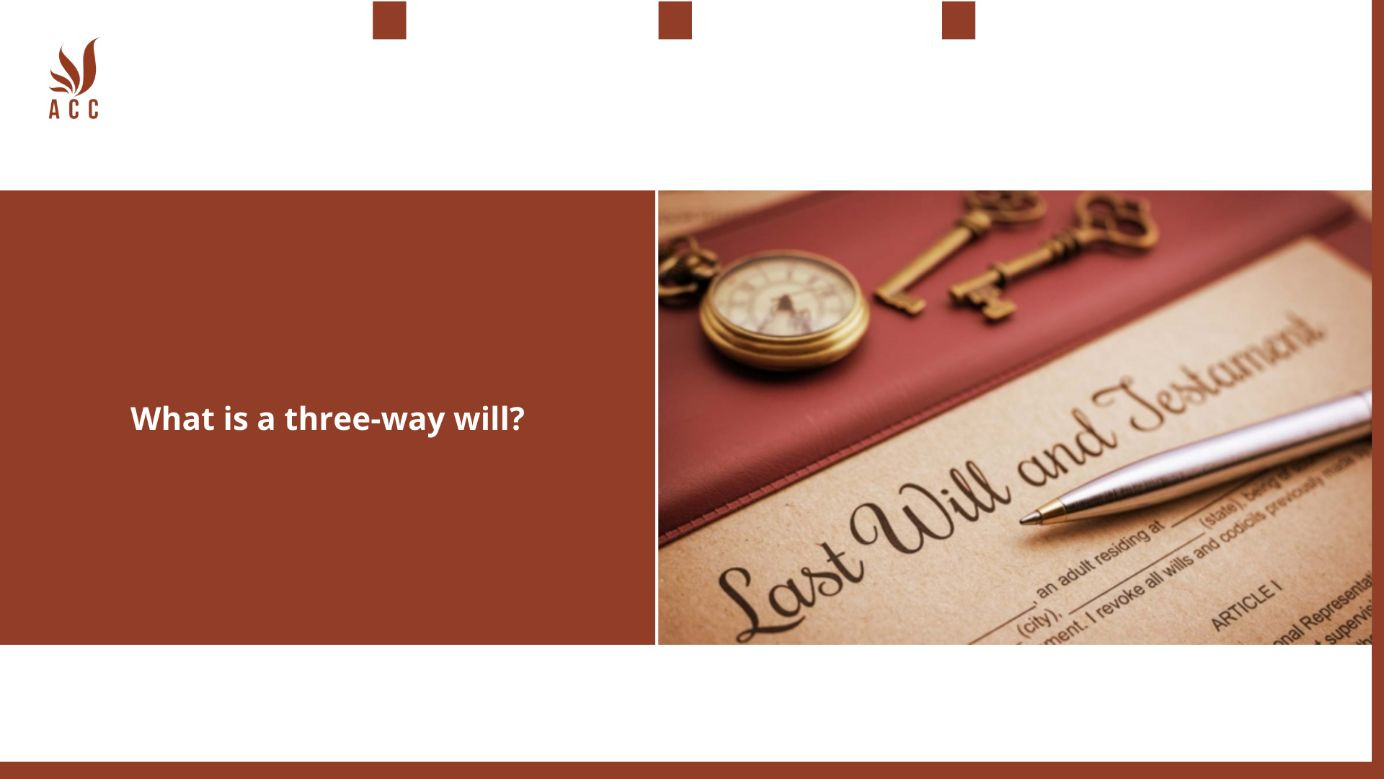A "three-way will" is not a standard legal term or document in the context of wills and estate planning. Wills are typically individual documents that outline one person's wishes for the distribution of their assets and property after their death. However, there may be some confusion or misunderstanding regarding the term "three-way will."
It's possible that the term "three-way will" is being used informally or colloquially to refer to a specific type of estate planning arrangement or agreement involving three individuals. Such arrangements might include:

1. Joint Wills:
In some cases, a "joint will" is a single document created by two individuals, often spouses, in which they outline their wishes for the distribution of their assets. Joint wills are typically used when both individuals have the same beneficiaries and distribution plan. After the death of one spouse, the surviving spouse is bound by the terms of the joint will and cannot change them.
2. Mutual Wills:
"Mutual wills" are separate wills created by two or more individuals, often in a close familial or business relationship. These wills contain similar or identical provisions, ensuring that the wishes of each person are respected. Mutual wills are used to create a legally binding agreement among the testators to follow a particular distribution plan.
3. Complex Estate Plans:
In some complex estate planning scenarios, there may be multiple parties involved, such as blended families, business partners, or charitable organizations. While these situations may involve multiple wills or estate planning documents, they are not typically referred to as "three-way wills" but rather as part of a comprehensive estate plan.
It's important to note that the terminology and legal requirements for wills and estate planning can vary by jurisdiction, so it's essential to consult with an attorney who specializes in estate planning to understand the specific legal options and documents available in your region. If you have encountered the term "three-way will" in a particular context, it may be advisable to seek clarification from a legal professional familiar with the relevant laws and practices.
4. When using ACC Law Firm's testament, entrepreneurs will receive
When using ACC Law Firm's testament, entrepreneurs will receive professional legal advice and assistance in drafting a comprehensive and legally binding will that reflects their specific business needs and objectives. The testament will ensure the smooth transition of their business assets and help protect their interests and those of their beneficiaries. Additionally, entrepreneurs will have access to ongoing support and guidance from experienced attorneys who specialize in estate planning for entrepreneurs.
5. Q&A
Q1: What is a three-way will?
A1: A three-way will is not a common legal term or document in the context of estate planning or wills. It's possible that you may be referring to a different concept or document, as there is no widely recognized legal definition for a "three-way will." If you could provide more context or clarify your question, I'd be happy to assist further.
Q2: Is a three-way will a type of will used in estate planning?
A2: There is no recognized category of will known as a "three-way will" in estate planning. Wills typically fall into standard categories such as a last will and testament, living will, or holographic will. If you have a specific situation or concept in mind related to estate planning, it's advisable to consult with an attorney to discuss the appropriate legal documents and strategies for your needs.
Q3: Can a will involve more than two parties or beneficiaries?
A3: Yes, a will can involve multiple beneficiaries, often referred to as "multi-party wills" or "complex wills." In such cases, the testator (the person making the will) can specify how their assets should be distributed among multiple beneficiaries, charitable organizations, or other entities. It's important to clearly outline these distribution instructions in the will to avoid potential disputes.
Q4: Are there any specific legal requirements for creating a will involving multiple parties or beneficiaries?
A4: The legal requirements for creating a will involving multiple parties or beneficiaries generally follow the same principles as standard wills. These requirements typically include the testator's clear intent, the appointment of an executor, the identification of beneficiaries, and the signatures of the testator and witnesses. However, the complexity of such wills may require legal expertise to ensure that all parties' interests are properly addressed and that the will complies with local laws.
If you have a specific scenario or concept in mind related to a "three-way will" or any other estate planning matter, it's advisable to consult with an attorney who specializes in estate planning to receive personalized guidance.
Nội dung bài viết:






Bình luận